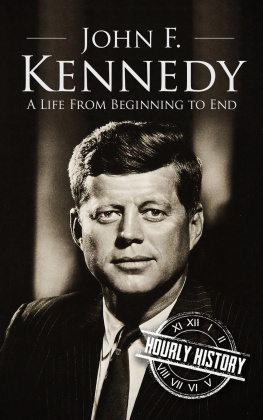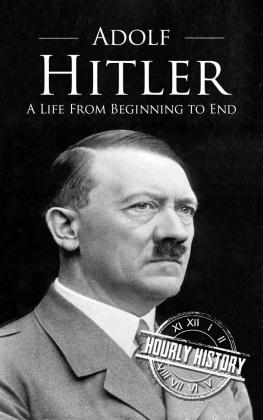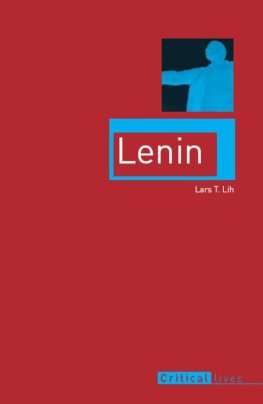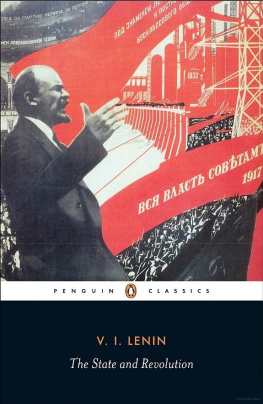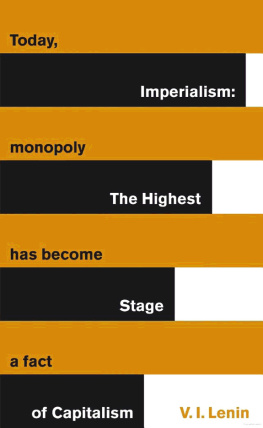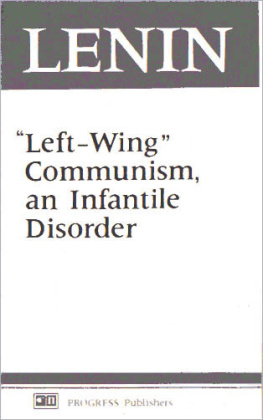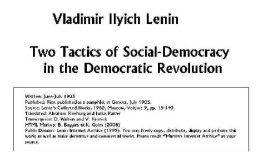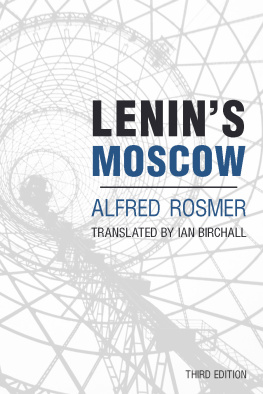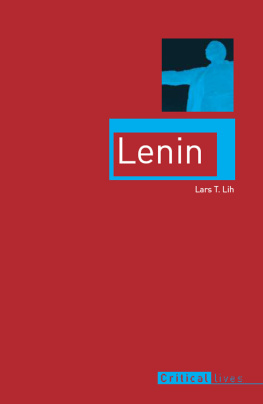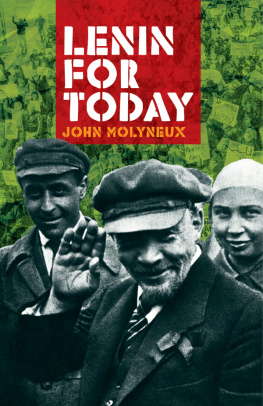VLADIMIR LENIN
A Life from Beginning to End
Series Information: Revolutionaries Book 4
Copyright 2017 by Hourly History
All rights reserved.
Table of Contents
Introduction
He is known as the man who brought communism to Russia. Yet this man was not born a communist. He wasnt born with a copy of Karl Marxs Communist Manifesto hanging out of his mouth. This child didnt cut his teeth on radical social ideology and doctrines. Vladimir Ilyich Ulyanovor as he would come to be known, Leninwas, for the most part, born a normal baby boy. His parents were fairly normal, too.
His father wasnt some revolutionary radical who championed the underclass; he was actually a valued member of the Russian noble class, the hard-working superintendent of his regions public education system. Lenins mother, the daughter of a renowned German physician, was also just as status quo. So what led this normal offspring, from a normal family, down the road of radical revolution?
As normal as Lenins beginnings were, the result of his lifes work and ambition are not. No one that knew Lenin during his long periods of exile could have ever imagined that this strange misfit who was rejected from Russian society would come back as the charismatic head of the Russian Revolution and lead the charge for a global communist takeover.
This short, bald-headed, goatee-and-moustached figure seemed to have walked right into the pages of history from the middle of nowhere. Yet everyone has a beginning and a current of purpose behind the many layers of his or her existence. So lets unravel the quite exceptional chapters that make up Vladimir Lenins life.
Chapter One
The Birth of Revolution
Give us a child for 8 years and it will be a Bolshevik forever.
Vladimir Lenin
The man who would become known as Lenin was born in the Russian provincial town of Simbirsk, Russia on April 22nd, 1870, with the given name of Vladimir Ilyich Ulyanov. His father was a state counselor and superintendent of the public schools in the area. This was a relatively posh position in the Old Russian state, placing him under the banner of the Ministry of Education, giving him all of the perks that came right along with that lofty position.
Lenins father opened up about 400 schools and oversaw the education of over 20,000 pupils. Lenins mother, the daughter a successful German doctor, was known for her caring and doting disposition with her children, especially the young Lenin. Contrary to what some may think, when they consider the revolutionary bent that Lenin would later take, he was not from the kind of dysfunctional family unit that usually tends to create uncompromising radicals.
By all accounts, Lenin had a good childhood and drew all the benefits from a close-knit and nurturing family. His parents were actively involved in his life; his mother is said to have taught him French while his father spent many hours teaching him chess. This happy family life would first taste tragedy, however, when Lenins 53-year-old father Ilya Ulyanov would pass away from a brain hemorrhage in January of 1886 when Lenin was just 16 years old.
The actual cause of his passing is somewhat unclear, but the death of his father would leave a severe mark on Vladimir Ilyich Lenins life. The previously well-adjusted young man soon went into a downward spiral of destructive behavior, becoming withdrawn and aggressive. With the death of his father, the previous bastion of authority in the young mans life, Lenin seemed to be without direction and was readily questioning any other authority figures that he encountered. This lack of faith in authority even extended to his belief in the most supreme authority of all, as Lenin renounced his belief in God in dramatic fashion.
In addition to the passing of his father, another dramatic event would come to adversely affect the young Lenin. Only one year had passed since Lenin lost his father when in 1887 his brother was arrested and then summarily executed.
Lenins older brother Alexander was a brilliant academic enrolled at Saint Petersburg University. Alexander had graduated from high school with honors and had plans to study science. He had already engaged in several successful research projects studying the biology of worms from which he had been awarded many prizes, including an expensive gold watch, for his efforts.
After a few months on campus, a darker side began to emerge that connected him to revolutionary organizations who sought to employ terroristic tactics against the Tsarist regime of Russia actively. Tactics that included the attempted assassination of the Tsar himself, a charge that Lenins brother Alexander would be directly implicated in.
Alexander, seemingly caught red-handed, was found with a homemade bomb hiddenin of all thingsa medical encyclopedia. To make things even more distressingly poignantin regard to the old life of gifted academia that Alexander was seemingly throwing awayhe had purchased the bomb-making materials by selling the gold watch he was awarded for his research on earthworms.
After standing trial with his alleged conspiratorial associates, Alexander would pay the ultimate price for his activities and have his life snuffed out by the Russian ruling elite. Stoic and bold until the end, it is said that Alexander refused to ask for any clemency and defied the court by proclaiming his rationale for revolution, After studying social and economic sciences I realize that change is not only possible, it is unavoidable.
Alexander had become caught up in the feelings of desperation that many young men of his station in late 19th century Russia had. He knew that he was doing marginally better than many others in Russian society, but even so, he realized that he too was stuck in a moribund system, with no freedom of movement or expression He saw no future and no hope. Alexander wanted to break out of this mold, and like many other radical anarchists of his day, he chose violence as a means of doing it.
That decision would leave his entire family in shock as they scrambled to pick up the pieces. When Lenins mother first heard of the charges, she dropped everything she was doing so that she could rush to St. Petersburg to see her son. She then urged him to plea for the mercy of the court, butno such pleas would be heard, and no clemency would be made. On May 8th, 1887, Lenins brother Alexander, along with four other conspirators, were given the hangmans noose for their role in the plot.
The death of his father, compounded with the arrest and execution of his brother, left Lenin the oldest male, and effectively the head of his family. Lenin felt overwhelmed by the unfair burden that the Russian state had left him with, but despite the hardship he buried his feelings of resentment deep within himself and continued his own studies. Persevering through his grief and suffering, Lenin would go on to graduate from his high school at the top of his class in 1887.
When seeking to further his education, however, he was not allowed to attend his brothers alma mater at the University of St. Petersburg, out of fear that he would somehow come to follow in his elder siblings example. Instead, he was shifted over to the auspices of Kazan University, where he enrolled in the Law School in August of 1887, and he lodged at a nearby dormitory.
Here Lenin became involved in a local fraternity called zemlyachestvo and quickly rose in popularity among the group until they made him their official representative in the university council. It was in his representation that he would first become involved in radical campus politics. In December of 1887 Lenin participated in a student protest against government encroachment on student societies.


